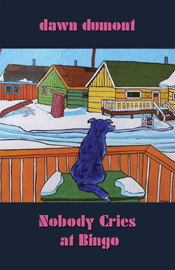| ________________
CM . . .
. Volume XVIII Number 1. . . .September 2, 2011 
 |
Nobody Cries at Bingo.
Dawn Dumont.
Saskatoon, SK: Thistledown Press, 2011.
298 pp., pbk., $15.95.
ISBN 978-1-897235-84-3.
Grades 8-12 / Ages 13-17.
Review by Ann Ketcheson.
*** /4
|
| |
|

excerpt:
We loved our orange and brown wood paneled station wagon. It wasn't just a mode of transportation: it was a bedroom, kitchen and playground. As Mom drove down the highway, my siblings and I would hang backwards over the seats until the blood rushed into our heads. From this view the world rushed towards us upside down. Sadly, like most fun things, if you did it too long, you'd end up throwing up.
Mom gossiped with her friend or if no friend was available, Tabitha, in the front seat while we played "Not It", "Freeze Tag" and "Tickle David until he cries." The back seat was our country and we had free rein over it as long as no one awakened Mom's attention. Eventually someone would start crying (usually Celeste or David) because someone had been too mean (usually me). Then Mom's yell would invade our territory and we'd have to sit up straight and face frontward, seat belts slung over our waists. We could not fasten them; the seat belt claps had broken years before. Safety wasn't the concern, seat belts were merely indications that we had heard and would behave.
In the summertime we never knew where the station wagon would go. A trip to town might become a glorious two-week journey to northern Manitoba or just a no-thrills ten minute trip back home. We'd never know for sure until we saw which direction the hood ornament pointed. If turning left led back to the reserve, we would whisper, "right, right, right." Up front, Mom's hands would drum on the steering wheel until her internal compass pointed her in the right direction.
During the school months, road trips weren't eliminated but they were shorter and tended to be inspired more by necessity than lark. Most of these trips were of the midnight run variety and as I got older they became more complicated. It's tough to explain to your teacher why your homework isn't done, tougher still to explain why you left all your books at home and that you don't know when you'll be going home to get them. Extra points if you can explain all this without referencing your dad's alcoholism.
Dawn, as narrator, gives her readers a personal view of what growing up on the Okanese First Nation was like. We meet her friends and extended family and watch as she deals with typical teen issues, such as siblings, school, dating and learning to drive. The book begins when Dawn is a kindergarten student, and, by the end, she has just finished her first year of law school.
Dumont paints a picture which goes beyond many cultural stereotypes. She talks about drinking and bingo and the toughness needed to deal with bullying by the other natives and also by her white peers. Readers see reserves both in Manitoba and Saskatchewan from the native point of view. There is a sense of how distanced these are, both literally and figuratively, from non-natives; yet, at the same time Dumont reveals how close-knit many families are, and she shows her readers that, despite cultural differences, natives and whites are really quite similar. Dawn has the same dreams, problems and aspirations as any other teenage girl.
Dumont's book is something between a novel and a memoir since the author was born and raised on the Okanese First Nation in Saskatchewan. As in any novel, each chapter adds to readers' understanding of the main characters, and yet each chapter can stand on its own as a short essay. Readers will appreciate Dumont's dry sense of humour throughout since Dumont undoubtedly 'tells it like it is' but always with her own brand of somewhat impertinent humour.
In a classroom or book club setting, Nobody Cries at Bingo would be an excellent springboard for a discussion about a wide variety of native issues and what can be done to promote understanding between natives and non-natives. Dumont's book approaches the issues in a manner which is both straightforward and humorous and perhaps suggests this is a good way for all of us to begin such a conversation.
Recommended.
Ann Ketcheson, who lives in Ottawa, ON, is a retired teacher-librarian and high school teacher of English and French.

To comment
on this title or this review, send mail to cm@umanitoba.ca.
Copyright © the Manitoba Library Association. Reproduction for personal
use is permitted only if this copyright notice is maintained. Any
other reproduction is prohibited without permission.
NEXT REVIEW |
TABLE OF CONTENTS FOR THIS ISSUE
- September 2, 2011May 20, 2011.
AUTHORS |
TITLES |
MEDIA REVIEWS |
PROFILES |
BACK ISSUES |
SEARCH |
CMARCHIVE |
HOME |
